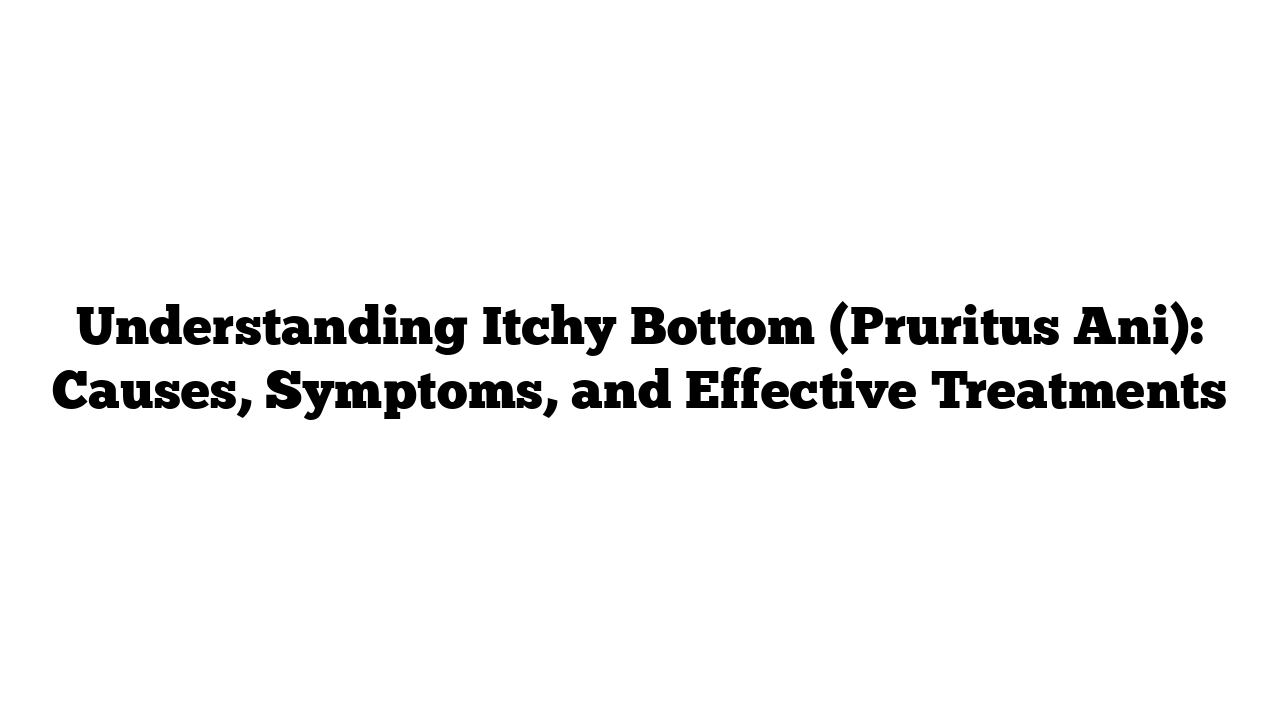Itchy Bottom (Pruritus Ani): Causes, Symptoms, and Treatment Tips
An itching bottom, also known medically as Pruritus Ani, can be uncomfortable and even embarrassing, but it’s a common condition with treatable causes. In this article, we’ll explore the six primary causes of pruritus ani, some effective treatments, and simple home remedies to relieve the itch. If you’ve been dealing with this issue, you’re not alone, and this article will guide you through managing and understanding it.
Common Causes of Pruritus Ani (Itchy Bottom)
1. Stool Contact
In around 90% of cases, the irritation results from stool residue staying in contact with the skin around the anus. Minor leaks, gas, and incomplete cleaning after bowel movements can lead to irritation. Conditions like constipation, diarrhea, hemorrhoids (piles), and skin tags increase the likelihood of stool leakage, making it challenging to keep the area clean and aggravating the itch. Overzealous cleaning or using harsh toilet paper can also irritate this sensitive area.
2. Skin Conditions
Skin conditions such as psoriasis, eczema, yeast infections (thrush), and other fungal infections can affect the skin around the anus, leading to itching and discomfort.
3. Threadworms
Threadworms are a common cause of itching, particularly in children, and symptoms usually worsen at night. They appear as tiny white worms in stool, resembling thin threads. If you suspect threadworms, over-the-counter treatments are available, and consulting a pharmacist is advisable.
4. Contact Allergies
Some people may be allergic to certain products, such as fragranced toilet paper, local anesthetics, or ingredients in hemorrhoid creams. Condoms, lubricants, or even moist wipes can also trigger reactions in this sensitive area, leading to itching and soreness.
5. Sweat and Moisture
The skin around the anus can stay moist due to sweat, particularly if you sit for long periods or wear tight clothing. This lack of ventilation can worsen irritation and make the itch more intense.
Symptoms of Pruritus Ani
If you’re experiencing a persistent itch, the skin around your bottom may appear inflamed or thickened, especially if you’ve scratched the area frequently. Scratching can lead to breaks in the skin, known medically as fissures, which can be painful and may cause bleeding during bowel movements. If these symptoms persist, consider speaking to your pharmacist for treatment advice, and if that doesn’t help, a visit to your doctor is recommended.
Treatment Options for Itchy Bottom
The right treatment for pruritus ani depends on the underlying cause. For instance, treatment for sweat-induced irritation will differ from that for threadworms. Here are some general treatments that may provide relief:
- Soothing Creams: Creams containing zinc oxide can help calm the skin, while moisturizing ointments provide a barrier to reduce irritation.
- Steroid Creams: Short-term use of steroid creams can reduce inflammation and itching. However, these should be used only as directed by a healthcare provider.
- Hemorrhoid Creams: Certain hemorrhoid treatments also help reduce itching. If there’s a rarer cause behind your symptoms, your provider may suggest other specialized creams or even medications.
Home Remedies for Relief
To manage pruritus ani effectively, try these self-care steps:
1. Support Digestive Health
Regular bowel movements are key to avoiding constipation or diarrhea, which can exacerbate the issue. Drink plenty of water and add fiber-rich foods to your diet, such as fruits, vegetables, whole grains, oats, and nuts. Some people find that coffee, soda, chocolate, and beer may worsen their symptoms. If that’s the case, try keeping a food diary for three to four weeks to identify any dietary triggers.
2. Gentle Cleaning Routine
After using the bathroom, gently clean the area with lukewarm water and pat dry with a soft towel. Avoid rubbing the skin and be careful to leave no soap or toilet tissue residue, as these can worsen irritation. Using a bidet can be especially helpful for gentle cleansing.
3. Avoid Irritants
Stay away from products that might irritate this sensitive area, such as moist wipes, deodorants, disinfectants, talcum powder, and perfumes. Opt for loose cotton underwear, keep your nails trimmed to avoid scratching, and try sleeping without clothing to allow the area to air out.
If you’ve found a method that works well for managing pruritus ani, sharing it could help others experiencing the same issue. And if you have persistent symptoms, consult your healthcare provider for advice and support.
FAQs about Pruritus Ani
1. Can stress cause an itchy bottom?
Stress doesn’t directly cause an itchy bottom, but it can exacerbate skin sensitivity and digestive issues, leading to irritation.
2. Are there foods that make pruritus ani worse?
Yes, some people find that caffeine, chocolate, alcohol, and spicy foods can worsen symptoms. Keeping a food diary may help identify triggers.
3. Can certain soaps or detergents cause pruritus ani?
Yes, soaps, perfumes, and laundry detergents can irritate sensitive skin. Hypoallergenic products are often a safer choice.
4. Should I see a doctor for an itchy bottom?
If self-care methods don’t improve your symptoms, or if you notice bleeding or severe pain, seeing a healthcare provider is important.
5. Can wearing tight clothes worsen pruritus ani?
Yes, tight clothing can trap sweat and heat, worsening irritation.
6. Can over-the-counter creams cure pruritus ani?
Creams can relieve symptoms but may not address the underlying cause. A healthcare provider can offer more targeted treatments if needed.
7. How can I prevent an itchy bottom?
Practicing good hygiene, wearing loose clothing, and managing digestive health can help prevent pruritus ani.
8. Can pruritus ani be contagious?
The condition itself isn’t contagious, but threadworms, a potential cause, are. Proper hygiene is essential.
9. Is pruritus ani a sign of a serious health problem?
Usually, pruritus ani is not serious and is manageable, but persistent symptoms should be checked by a healthcare provider.
10. Are there natural remedies for an itchy bottom?
Moisturizing with aloe vera and avoiding irritants can help. However, if symptoms persist, consult a healthcare provider.
